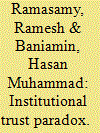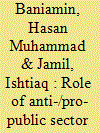|
|
|
Sort Order |
|
|
|
Items / Page
|
|
|
|
|
|
|
| Srl | Item |
| 1 |
ID:
190163


|
|
|
|
|
| Summary/Abstract |
The article explores institutional trust dynamics in Sri Lanka and asks what accounts for varying levels of trust different ethnic groups have in governance institutions in the post-war context. Three decades of ethnic conflict, the emergence of ethno-religious polarisation since the end of civil war, militarised ethnocracy, and the majoritarian ethnocratic state all highlight the need to understand these dynamics. The article presents the results of twonationally representative surveys on institutional trust in Sri Lanka (2015 & 2020), which showed a puzzling trend: in 2015, minorities had higher trust in public institutions, whereas, in 2020, the same minorities had lower trust. The study finds that citizens’ evaluation of public institutions is affected by ethnic cleavages, institutional fairness, and perceived performance. On the one hand, Sinhala–Buddhist ideology and dominance of ethnic majority in public institutions are more likely to determine institutional trust among the ethnic majority Sinhalese; on the other, perceived injustice and unfair treatment shapes institutional trust among the ethnic minorities. Overall, the study finds that an increase in institutional performance may not be sufficient; institutionalising equal treatment, fairness, and enhancing governance quality are necessary to enhance institutional trust among all ethnic groups in ethnically polarized societies.
|
|
|
|
|
|
|
|
|
|
|
|
|
|
|
|
| 2 |
ID:
192863


|
|
|
|
|
| Summary/Abstract |
People may evaluate the same level of performance differently because of different biases. The study explores the possible effects of anti-/pro-public-sector bias on perceived performance and fairness in South Asian countries. Using a survey experiment involving a vignette of identical performance (same level of performance) in public and private hospitals, the study finds lower perceived performance in Bangladesh for the public hospitals due to anti-public-sector bias. However, such an effect was not found in other South Asian countries. Rather, the study finds that in India and Sri Lanka, people assessed greater fairness in public hospitals than in private hospitals for the same quality of services. This assessment of fairness may result from pro-public sector bias. Thus, the evaluation of organizational performance can be shaped by sectoral biases, and people may report different levels of performance for identical performance.
|
|
|
|
|
|
|
|
|
|
|
|
|
|
|
|
|
|
|
|
|